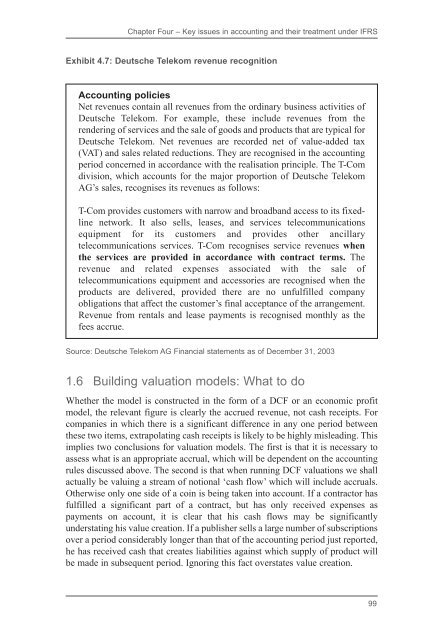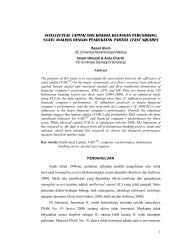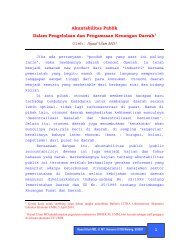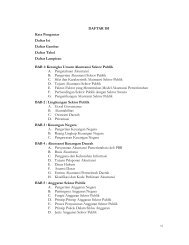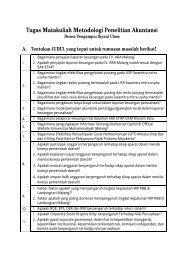- Page 1 and 2:
Company valuation IFRS under Interp
- Page 3 and 4:
HARRIMAN HOUSE LTD 3A Penns Road Pe
- Page 6 and 7:
Contents Index of exhibits About th
- Page 8 and 9:
Index of exhibits Chapter One 1.1 C
- Page 10 and 11:
Index of exhibits 4.28 Capitalising
- Page 12:
About the authors Nick Antill: Sinc
- Page 15 and 16:
Company valuation under IFRS Most q
- Page 17 and 18:
Company valuation under IFRS Chapte
- Page 20:
Acknowledgments The authors have be
- Page 23 and 24:
Company valuation under IFRS Are th
- Page 25 and 26:
Company valuation under IFRS In add
- Page 27 and 28:
Company valuation under IFRS The sa
- Page 29 and 30:
Company valuation under IFRS Furthe
- Page 31 and 32:
Company valuation under IFRS Our pr
- Page 33 and 34:
Company valuation under IFRS Sadly,
- Page 35 and 36:
Company valuation under IFRS Exhibi
- Page 37 and 38:
Company valuation under IFRS Exhibi
- Page 39 and 40:
Company valuation under IFRS would
- Page 41 and 42:
Company valuation under IFRS the ea
- Page 43 and 44:
Company valuation under IFRS One ad
- Page 45 and 46:
Company valuation under IFRS To spe
- Page 47 and 48:
Company valuation under IFRS Exhibi
- Page 49 and 50:
Company valuation under IFRS 2. Div
- Page 51 and 52:
Company valuation under IFRS This w
- Page 53 and 54:
Company valuation under IFRS portfo
- Page 55 and 56:
Company valuation under IFRS portfo
- Page 57 and 58:
Company valuation under IFRS Exhibi
- Page 59 and 60:
Company valuation under IFRS premiu
- Page 61 and 62:
Company valuation under IFRS Exhibi
- Page 63 and 64:
Company valuation under IFRS K E =R
- Page 65 and 66:
Company valuation under IFRS 5. Bui
- Page 67 and 68:
Company valuation under IFRS Exhibi
- Page 69 and 70:
Company valuation under IFRS depend
- Page 71 and 72:
Company valuation under IFRS The ta
- Page 73 and 74: Company valuation under IFRS 1. We
- Page 75 and 76: Company valuation under IFRS The AP
- Page 77 and 78: Company valuation under IFRS averag
- Page 79 and 80: Company valuation under IFRS 6. Tim
- Page 81 and 82: Company valuation under IFRS Exhibi
- Page 83 and 84: Company valuation under IFRS Exhibi
- Page 85 and 86: Company valuation under IFRS Exhibi
- Page 87 and 88: Company valuation under IFRS 2. Est
- Page 89 and 90: Company valuation under IFRS Equity
- Page 91 and 92: Company valuation under IFRS Exhibi
- Page 93 and 94: Company valuation under IFRS 8. Int
- Page 95 and 96: Company valuation under IFRS 7. Is
- Page 97 and 98: Company valuation under IFRS 1. IRR
- Page 99 and 100: Company valuation under IFRS The fi
- Page 101 and 102: Company valuation under IFRS underg
- Page 103 and 104: Company valuation under IFRS Exhibi
- Page 105 and 106: Company valuation under IFRS In thi
- Page 107 and 108: Company valuation under IFRS 3. For
- Page 109 and 110: Company valuation under IFRS Chart
- Page 111 and 112: Company valuation under IFRS Someth
- Page 113 and 114: Company valuation under IFRS Notwit
- Page 115 and 116: Company valuation under IFRS produc
- Page 117 and 118: Company valuation under IFRS perfor
- Page 119 and 120: Company valuation under IFRS 1.3 US
- Page 121 and 122: Company valuation under IFRS guaran
- Page 123: Company valuation under IFRS 1.5 Ca
- Page 127 and 128: Company valuation under IFRS • Th
- Page 129 and 130: Company valuation under IFRS The ot
- Page 131 and 132: Company valuation under IFRS The mo
- Page 133 and 134: Company valuation under IFRS Once c
- Page 135 and 136: Company valuation under IFRS The va
- Page 137 and 138: Company valuation under IFRS 3.3 US
- Page 139 and 140: Company valuation under IFRS Exhibi
- Page 141 and 142: Company valuation under IFRS The pr
- Page 143 and 144: Company valuation under IFRS 4.2 Wh
- Page 145 and 146: Company valuation under IFRS The ca
- Page 147 and 148: Company valuation under IFRS Gains
- Page 149 and 150: Company valuation under IFRS Soluti
- Page 151 and 152: Company valuation under IFRS Exhibi
- Page 153 and 154: Company valuation under IFRS • IA
- Page 155 and 156: Company valuation under IFRS Exampl
- Page 157 and 158: Company valuation under IFRS 5.3 US
- Page 159 and 160: Company valuation under IFRS 5.5 Im
- Page 161 and 162: Company valuation under IFRS Exhibi
- Page 163 and 164: Company valuation under IFRS Exhibi
- Page 165 and 166: Company valuation under IFRS 6.4 Ca
- Page 167 and 168: Company valuation under IFRS physic
- Page 169 and 170: Company valuation under IFRS • Re
- Page 171 and 172: Company valuation under IFRS 1. For
- Page 173 and 174: Company valuation under IFRS Exampl
- Page 175 and 176:
Company valuation under IFRS Deriva
- Page 177 and 178:
Company valuation under IFRS 2. It
- Page 179 and 180:
Company valuation under IFRS Most a
- Page 181 and 182:
Company valuation under IFRS The di
- Page 183 and 184:
Company valuation under IFRS 8.4 Ca
- Page 185 and 186:
Company valuation under IFRS 8.5 Im
- Page 187 and 188:
Company valuation under IFRS 9.2 Wh
- Page 189 and 190:
Company valuation under IFRS In man
- Page 191 and 192:
Company valuation under IFRS balanc
- Page 194 and 195:
Chapter Five Valuing a company Pull
- Page 196 and 197:
Chapter Five - Valuing a company Ex
- Page 198 and 199:
Chapter Five - Valuing a company 3.
- Page 200 and 201:
Chapter Five - Valuing a company 5.
- Page 202 and 203:
Chapter Five - Valuing a company 9.
- Page 204 and 205:
Chapter Five - Valuing a company an
- Page 206 and 207:
Chapter Five - Valuing a company gu
- Page 208 and 209:
Chapter Five - Valuing a company 1.
- Page 210 and 211:
Chapter Five - Valuing a company To
- Page 212 and 213:
Chapter Five - Valuing a company Be
- Page 214 and 215:
Chapter Five - Valuing a company fl
- Page 216 and 217:
Chapter Five - Valuing a company As
- Page 218 and 219:
Chapter Five - Valuing a company 1.
- Page 220 and 221:
Chapter Five - Valuing a company Ho
- Page 222 and 223:
Chapter Five - Valuing a company sh
- Page 224 and 225:
Chapter Five - Valuing a company we
- Page 226 and 227:
Chapter Five - Valuing a company is
- Page 228 and 229:
Chapter Five - Valuing a company 12
- Page 230 and 231:
Chapter Five - Valuing a company 3.
- Page 232 and 233:
Chapter Five - Valuing a company ve
- Page 234 and 235:
Chapter Five - Valuing a company wh
- Page 236 and 237:
Chapter Five - Valuing a company ge
- Page 238 and 239:
Chapter Five - Valuing a company in
- Page 240 and 241:
Chapter Five - Valuing a company 4.
- Page 242 and 243:
Chapter Five - Valuing a company 13
- Page 244 and 245:
Chapter Five - Valuing a company (S
- Page 246 and 247:
Chapter Five - Valuing a company Ra
- Page 248 and 249:
Chapter Five - Valuing a company Ex
- Page 250 and 251:
Chapter Five - Valuing a company Ex
- Page 252 and 253:
Chapter Five - Valuing a company ca
- Page 254 and 255:
Chapter Five - Valuing a company Th
- Page 256 and 257:
Chapter Five - Valuing a company Pe
- Page 258 and 259:
Chapter Five - Valuing a company Ba
- Page 260 and 261:
Chapter Five - Valuing a company Sh
- Page 262 and 263:
Chapter Five - Valuing a company Th
- Page 264 and 265:
Chapter Five - Valuing a company 5.
- Page 266 and 267:
Chapter Five - Valuing a company gr
- Page 268:
Chapter Five - Valuing a company fo
- Page 271 and 272:
Company valuation under IFRS • Th
- Page 273 and 274:
Company valuation under IFRS explic
- Page 275 and 276:
Company valuation under IFRS 2. CCA
- Page 277 and 278:
Company valuation under IFRS 5. Nom
- Page 279 and 280:
Company valuation under IFRS The fi
- Page 281 and 282:
Company valuation under IFRS IRR of
- Page 283 and 284:
Company valuation under IFRS 1.4.7
- Page 285 and 286:
Company valuation under IFRS knew t
- Page 287 and 288:
Company valuation under IFRS to tra
- Page 289 and 290:
Company valuation under IFRS of it
- Page 291 and 292:
Company valuation under IFRS This a
- Page 293 and 294:
Company valuation under IFRS 4. ROC
- Page 295 and 296:
Company valuation under IFRS Costs
- Page 297 and 298:
Company valuation under IFRS 2. The
- Page 299 and 300:
Company valuation under IFRS 3.1.1
- Page 301 and 302:
Company valuation under IFRS 1. The
- Page 303 and 304:
Company valuation under IFRS Securi
- Page 305 and 306:
Company valuation under IFRS Regula
- Page 307 and 308:
Company valuation under IFRS Perpet
- Page 309 and 310:
Company valuation under IFRS Tier 3
- Page 311 and 312:
Company valuation under IFRS Exhibi
- Page 313 and 314:
Company valuation under IFRS flow t
- Page 315 and 316:
Company valuation under IFRS Exhibi
- Page 317 and 318:
Company valuation under IFRS 3. Com
- Page 319 and 320:
Company valuation under IFRS 7. Com
- Page 321 and 322:
Company valuation under IFRS Turnin
- Page 323 and 324:
Company valuation under IFRS 3.6.9
- Page 325 and 326:
Company valuation under IFRS costs
- Page 327 and 328:
Company valuation under IFRS Exhibi
- Page 329 and 330:
Company valuation under IFRS 2. If
- Page 331 and 332:
Company valuation under IFRS The ma
- Page 333 and 334:
Company valuation under IFRS 4.2 Re
- Page 335 and 336:
Company valuation under IFRS • Pr
- Page 337 and 338:
Company valuation under IFRS The re
- Page 339 and 340:
Company valuation under IFRS 3. Sun
- Page 341 and 342:
Company valuation under IFRS 5. Sun
- Page 343 and 344:
Company valuation under IFRS 7. Sun
- Page 345 and 346:
Company valuation under IFRS 10. Su
- Page 347 and 348:
Company valuation under IFRS How ca
- Page 349 and 350:
Company valuation under IFRS techni
- Page 351 and 352:
Company valuation under IFRS Exhibi
- Page 353 and 354:
Company valuation under IFRS Under
- Page 355 and 356:
Company valuation under IFRS assump
- Page 357 and 358:
Company valuation under IFRS 4. Leg
- Page 359 and 360:
Company valuation under IFRS busine
- Page 361 and 362:
Company valuation under IFRS Model
- Page 363 and 364:
Company valuation under IFRS capita
- Page 365 and 366:
Company valuation under IFRS to fad
- Page 368 and 369:
Chapter Seven An introduction to co
- Page 370 and 371:
Chapter Seven - An introduction to
- Page 372 and 373:
Chapter Seven - An introduction to
- Page 374 and 375:
Chapter Seven - An introduction to
- Page 376 and 377:
Chapter Seven - An introduction to
- Page 378 and 379:
Chapter Seven - An introduction to
- Page 380 and 381:
Chapter Seven - An introduction to
- Page 382 and 383:
Chapter Seven - An introduction to
- Page 384 and 385:
Chapter Seven - An introduction to
- Page 386 and 387:
Chapter Seven - An introduction to
- Page 388 and 389:
Chapter Seven - An introduction to
- Page 390 and 391:
Chapter Seven - An introduction to
- Page 392 and 393:
Chapter Seven - An introduction to
- Page 394 and 395:
Chapter Seven - An introduction to
- Page 396 and 397:
Chapter Seven - An introduction to
- Page 398 and 399:
Chapter Seven - An introduction to
- Page 400 and 401:
Chapter Seven - An introduction to
- Page 402 and 403:
Chapter Seven - An introduction to
- Page 404 and 405:
Chapter Eight Conclusions and conti
- Page 406 and 407:
Chapter Eight - Conclusions and con
- Page 408 and 409:
Chapter Eight - Conclusions and con
- Page 410 and 411:
Further reading Introduction This b
- Page 412:
Further reading Difficult sectors T
- Page 415 and 416:
Company valuation under IFRS IAS 26
- Page 417 and 418:
Company valuation under IFRS Jurisd
- Page 419 and 420:
Company valuation under IFRS Analys
- Page 421 and 422:
Company valuation under IFRS 5. Lev
- Page 424 and 425:
Index A Accrual 14-15, 90, 99, 106,
- Page 426 and 427:
Index E Earned premiums 301-303, 32
- Page 428 and 429:
Index J Joint venture 354 L Leases
- Page 430 and 431:
Index Regulatory capital 274, 281,


